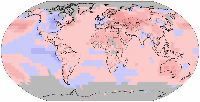Global temperatures in 2013
The year 2013 is among the 10 warmest since modern records began in 1850. The exact ranking depends on the source (or, more precisely, on the data source used): Thus, for instance, according to NOAA National Climatic Data Center it is classified with 2003 as the fourth warmest year globally. According to NASA Goddard Institute for Space Studies it ranks as the seventh warmest year. With the exception of 1998, the 10 warmest years in the 134-year record all have occurred since 2000, with 2010 and 2005 ranking as the warmest years on record. The global annual temperature has increased at an average rate of 0.06 °C per decade since 1880 and at an average rate of 0.16 °C per decade since 1970. Scientists emphasize that weather patterns and natural oscillations always will cause fluctuations in average temperatures from year to year and even on the decadal scale, but the continued increases in greenhouse gas levels in Earth's atmosphere are driving a long-term rise in global temperatures. Each successive year will not necessarily be warmer than the year before, but with the current level of greenhouse gas emissions, scientists expect each successive decade to be warmer than the previous.

Sources:
> NASA Goddard Institute for Space Studies
> NOAA National Climatic Data Center
> World Meteorological Organization (WMO)
Charts:
> Land & Ocean Temperature Anomalies Jan-Dec 2013 (Image Credit: NASA/GSFC/Earth Observatory, NASA/GISS)
> Temperature anomalies for 1950-2013, also showing the phase of the El Niño-La Niña cycle. (Image Credit: NASA/GSFC/Earth Observatory, NASA/GISS)

